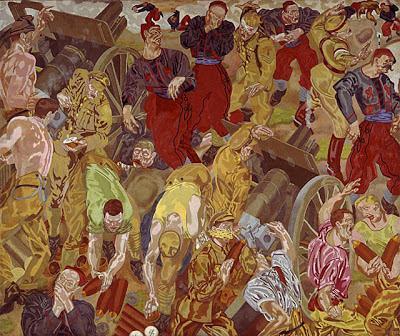
First German Gas Attack at Ypres by William Roberts
Source.British entries on the Somme (National Archives) and on Passchendaele (the Wellcome Library).
Five Oxford University podcasts: 'Oh What a Lovely War? First World War Anniversary Lectures'.
Images and more from Canada's National Film Board.
Two items about Canadians defending against an early gas attack (at Ypres): Battle of Gravenstafel Ridge and Chlorine at Ypres.
Entries on WWI German generals.
Shashi Tharoor on the 1.3 million Indian troops who served in WWI.
Issam M. Fares on the Great War's devastation of the Middle East.
An extract from Charles Townshend's When God Made Hell: The British Invasion of Mesopotamia and the Creation of Iraq, 1914-1921.
French and German families commemorate the first (?) WWI casualties: 'French Lance Corporal Jules-Andre Peugeot and German Sub-Lieutenant Albert Mayer died in a fire exchange on August 2, 1914, one day before Germany formally declared war on France.'
Gary Sheffield looks at several books about the outbreak of WWI.
Review of John Gooch's The Italian Army and the First World War (2014).
Here's an International Encyclopedia of WWI.
'The 1914 Christmas Truces as History and Memory'.
From the BBC, several items on the influence of Craiglockhart Hospital (where Wilfred Owen met Siegfried Sassoon) on mental healthcare.
An American blog on WWI: Roads to the Great War; and the excellent Great War Fiction blog.
A very thorough collection of dust jackets for WWI books.
'How Tolkien's Experiences on the Somme in World War One Inspired his Famous Stories'.
In 2014, Yale published Edward M. Strauss' new translation of Louis Barthas' Poilu: The World War I Notebooks of Corporal Louis Barthas, Barrelmaker, 1914-1918.
Also in 2014, Thomas Keneally reviews Gabriel Chevalier's Fear (trans. Malcolm Imrie).
Susan R. Grayzel on teaching Henri Barbusse's Le Feu/Under Fire.
From last September in the TLS blog, 'Charles Péguy, early victim of the Great War'.
From the same blog, a post on the TLS reviewer and Russianist George Calderon. Here's Calderon on Tolstoy:
Tolstoi is, above all things, a good hater. In War and Peace he wants to lower Napoleon, his chosen enemy, in the eyes of the world. The ascription of his successes and failures to Fate is a splendid humiliation; there is such a crushing moderation about it.Balliol College's page on WWI poet Patrick Shaw-Stewart. One of his friends, Ronald Knox, wrote a book about Shaw-Stewart.
A review of Brian Bond's book on Western Front memoirs, and one of Ross Davie' 'A Student in Arms': Donald Hankey and Edwardian Society at War.
Paul Johnson on Max Egremont's Some Desperate Glory: The First World War the Poets Knew. David Crane reviews Some Desperate Glory: The First World War the Poets Knew.
Andrew Lycett on Rudyard Kipling: 'His early propagandist efforts were admittedly silly, fueled by his virulent anti-Germanism. But as the conflict intensified, particularly after his only son John was killed at the Battle of Loos in September 1915, he was as merciless as Sassoon or Gurney in depicting the random cruelty of war.'
From the Australian Broadcast Corporation, Michael Cathcart talks to Mark Dapin about ANZAC WWI memoirs and poems, etc.
Excerpts of a German graphic-book version of Karl Kraus's Last Days.
